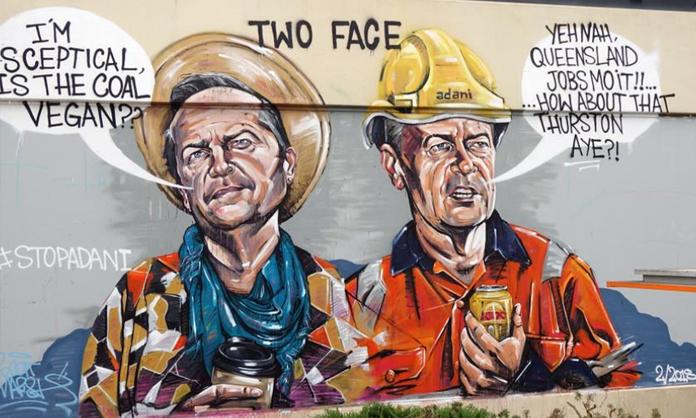“Coalition heartland” declared the Courier Mail on Monday morning. The two-party preferred swings to the LNP in central and north Queensland – 8 percent in Herbert, 11 percent in Dawson, 11 percent in Capricornia and 5 percent in Flynn – and the record low primary vote for the ALP across the state, just 27 percent, seem to make the case that Queensland is now enemy territory for Labor. The party is now down to just six federal seats out of 30 in Queensland.
But let’s put some of this in perspective. Yes, the swing against Labor was worst in Queensland, but Labor’s losses in the state did not, contrary to a lot of the commentary, cost the party the election. Leaving aside the redistributions, Labor so far has picked up only one seat from the Coalition across the entire country, Gilmore in NSW.
The right wing has wasted no time seizing on the Queensland results to argue that the ALP must shift to the right on “retiree taxes”, on superannuation, but most obviously on coal mining. The savage swings in coal mining areas are attributed to Shorten’s refusal to come out hard in favour of Adani. The right is arguing that unless federal Labor embraces the coal mining industry, the party faces permanent political pariah status in Queensland. The same is true in state politics, with former Labor cabinet ministers telling the Palaszczuk government to “bite the bullet” on Adani if it is to have any hope of winning the state election in October next year.
But, again, some facts. Labor never opposed the Carmichael coal mine in central Queensland. Its candidate in Flynn, regarded as a marginal seat and which Labor and the unions threw a lot of resources into, repeatedly confirmed his support for Adani. There was an alternative to Labor’s bob each way approach to the mine. Had Labor come out unequivocally against the Carmichael mine, but accompanied that with a commitment to large scale public sector job creation programs on union rates of pay, and had it made a serious commitment to tackling the climate emergency, this could have done two things.
First, Labor would have boosted its primary vote in Brisbane. The Greens, who came out squarely against the mine, did well in Queensland, traditionally a state where they have performed poorly. In the lower house, they increased their share of the primary vote by 1.3 percent to 10.1 percent. In Griffith, in inner city Brisbane, the Greens scored a swing of 7 percent and a primary vote of 24 percent against a Labor candidate from the left. In the Senate, the Greens boosted their share of the vote by five percentage points to 11.7 percent, another record. There is a significant vote in Queensland for policies that respond to the urgency of the environmental dangers we now face. Labor threw those votes away by supporting Adani and putting forward half-hearted climate measures.
Second, even if Labor would likely not have won the majority of the mining seats, a commitment to a crash program of job creation would have put the party on a much better footing to limit the losses and to prepare to win these seats in the next election or two as Adani’s false promises became obvious. While Dawson has traditionally been a safe LNP seat, held by the party since 1975 with a brief Labor interlude in 2007-10, Labor won Herbert at the last election. Capricornia, where Labor’s primary vote collapsed by 13 percent, was held by Labor for 37 of the 41 years between 1972 and 2013.
There is real disadvantage in many areas of the mining region. In Townsville, unemployment is the third highest in the state (7.8 percent). More than 9,000 people are looking for work in the city. Very few will get jobs from the Adani project. Many more could have found work if Labor had promised to stop giving handouts to the mining companies and spent the money on labour-intensive industries such as public sector construction, transport, renewable energy, along with the manufacturing needed to make the relevant equipment and infrastructure, health, education and social services. To help workers get these jobs, Labor could have committed to scrapping the privatised training providers and offering thousands of places in fully funded TAFE colleges.
Workers in the mining regions could have been won to working class and pro-environmental politics had Labor made a serious case.
The situation facing workers in regional Queensland makes all the more appalling the prevailing commentary on liberal social media the day after the election. “Stupid bloody rednecks, why didn’t they understand what was good for them”, about sums it up. Nothing could be more likely to cement in place the hegemony of the right wing parties and media than this dismissive and elitist rubbish. It buys into the right wing argument that the country is divided into two camps: the inner city, latte-sipping elites with liberal social agendas, and “the battlers” – the hard-working, no-nonsense Aussies with no time for tree hugging, bleeding heart refugee supporters.
The right wing do this because they want to split the progressive camp; they want to make it appear that blue collar workers should trust the right wing, neoliberal governments that are wrecking the futures of so many working class people. The mining union also did it, telling workers not to vote for any party that opposed Adani. So voting for the fascists in One Nation or the National Conservative Party was presumably okay, but a vote for the Greens was not. Why should progressive liberals make this job of dividing our forces any easier for them?
This argument is also a cop-out as it lets Labor off the hook. The problem in this election is not that workers in regional Queensland are stupid but that many people simply did not trust the ALP. Given the party’s record over the past four decades, who could blame them?
Environmental destruction and economic insecurity have to be tackled together. This can be done only by challenging capitalist priorities head on. The Greens and liberal organisations cannot play this role because, while they fight some symptoms of capitalist decay, they will not get to the root of it. They may champion renewables but are happy for these to be left in the hands of business and subject to market forces.
The fight to stop the planet burning is the same as the fight for jobs, health care and education: the enemies we face are the same, and our fight for a better world will be stronger if we link arms rather than brandish our fists against each other.









